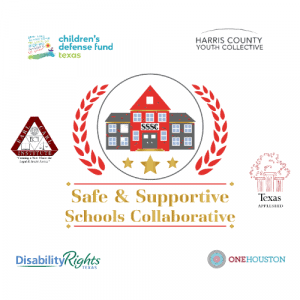These students should not be met with harsh school discipline that leads them directly to the school-to-prison pipeline. Our students need to be
HOUSTON, TEXAS, USA, November 16, 2020 /EINPresswire.com/ — A coalition of nonprofit organizations is challenging public schools to reimagine policies designed to enhance the safety and security of its students. It begins with a transformative approach that replaces traditional law enforcement figures with more counselors.
Building on years of research and advocacy, the Safe and Supportive Schools Collaborative used public records requests, story collection, and federal data to demonstrate how the “school-to-prison pipeline” is alive and well in 2020, particularly among schools in underserved communities.
Andrew Hairston, the Education Justice Project Director for Texas Appleseed explained the findings.
“In the Counselors Not Cops report, the Safe and Supportive Schools Collaborative evaluated use of force incidents and arrests perpetrated by school police officers in seven independent school districts, including Houston ISD, Spring ISD, Cypress-Fairbanks ISD, Clear Creek ISD, Aldine ISD, Pasadena ISD, and Katy ISD, from 2017 to 2019. The report concludes that, across these interactions with school-based law enforcement, Black children are disproportionately represented in these occurrences, as are children with disabilities,” said Hairston.
The Safe and Supportive Schools Collaborative finds it important to note that despite the Houston Independent School District’s (HISD) decline in exclusionary discipline referrals, the district still has one of the state’s largest racial and ethnic disparities in discipline. According to a 2018 article in the Houston Chronicle, within HISD, the rate of out-of-school suspensions for Black students in the 2017-18 school year was nearly eight times that of their white counterparts, while Black students only represented 22.7% of district enrollment.
Fort Bend ISD has also found itself under a federal microscope. According to the Counselors Not Cops campaign, the U.S. Department of Education’s Office for Civil Rights found the district discriminated against African-American students by disciplining them more frequently and harshly than other students in similar situations. Currently, while FBISD claims to have remedied the situation, TEA data demonstrate that racial disproportionality persists in the disciplinary referrals that are administered in the district.
The Counselors Not Cops campaign’s mission is to reduce the criminalization of students who find themselves facing disciplinary action, often for age-appropriate behavior. Proponents of this policy shift say the problem is two-fold: first, it doesn’t work, and secondly, the impact on the student can last a lifetime.
The group reported on studies examining whether a police presence increases school safety. All have either been inconclusive or found that school policing has no significant impact on improving a student’s behavior or a school’s climate.
In spite of those results, researchers found school police officers are well-funded in districts across the country, while counselors, particularly in inner-city schools, are not. For example, Houston ISD spends nearly $18 million per academic year to fund its internal school police department and employ over 150 school police officers.
“The report analyzes the staffing numbers of school psychologists, school counselors, social workers, and school police officers in these districts; the report concludes that none of the districts meet recommended ratios of school counselors, school psychologists, and social workers to students,” said Hairston.
For example, the American School Counselor Association's recommended ratio is one counselor per 250 students. HISD’s ratio is approximately one counselor per 1100 students.
Another key finding included in the report is that the increase in school police has created unnecessary interactions between students and police. According to federal data from April 2018, Black children represented 15 percent of national public-school enrollment; yet, they accounted for 31 percent of school-based referrals to law enforcement.
The Safe and Supportive Schools Collaborative is not just relying on data to effect change. The group’s campaign is also sharing compelling stories of youth who wind up deeper into the juvenile justice system and in many cases, even sent to correctional facilities.
The group says it is finding some reason to be encouraged. In a remarkable turn of events recently, school boards in cities such as Minneapolis-St. Paul, Columbus, Oakland, Portland, Charlottesville, and Rochester have taken significant steps to end contracts with local police departments.
But Hairston points out much more work lies ahead.
“In the time of the coronavirus pandemic and mass social movements against police violence, the data in the Counselors Not Cops report and the experiences of children and families make clear that these districts should divest from school policing and invest in mental health resources for K-12 learners in and around Harris County.”
According to Sarah Guidry, Executive Director of the Earl Carl Institute at Texas Southern University, “we expect the need for mental health counselors has risen during this period of remote learning. As our students return to school, having lost months of instructional and behavioral supports, the trauma they will have experienced will manifest itself and will need to be addressed in the school environment. Many Title I students have found themselves not having the same access to food. Children are dealing with family members who have lost jobs. They are dealing with relatives and friends who have contracted COVID-19. Many have not hugged their grandparents in months. These traumas can only be addressed through the use of mental health counselors and other social services providers. These students should not be met with harsh school discipline that leads them directly to the school-to-prison pipeline. Our students need to be properly counseled, not criminalized.”
The Safe and Supportive Schools Collaborative includes the Earl Carl Institute for Legal and Social Policy, Texas Appleseed, Disability Rights Texas, Children’s Defense Fund, One Houston, and Harris County Youth Collective.
For more information on the Counselors Not Cops campaign and to read the full report, go to counselorsnotcops.org.
Sarah Guidry
Earl Carl Institute for Legal and Social Policy
+1 713-313-4869
sarah.guidry@tmslaw.tsu.edu
Visit us on social media:
Facebook
![]()
